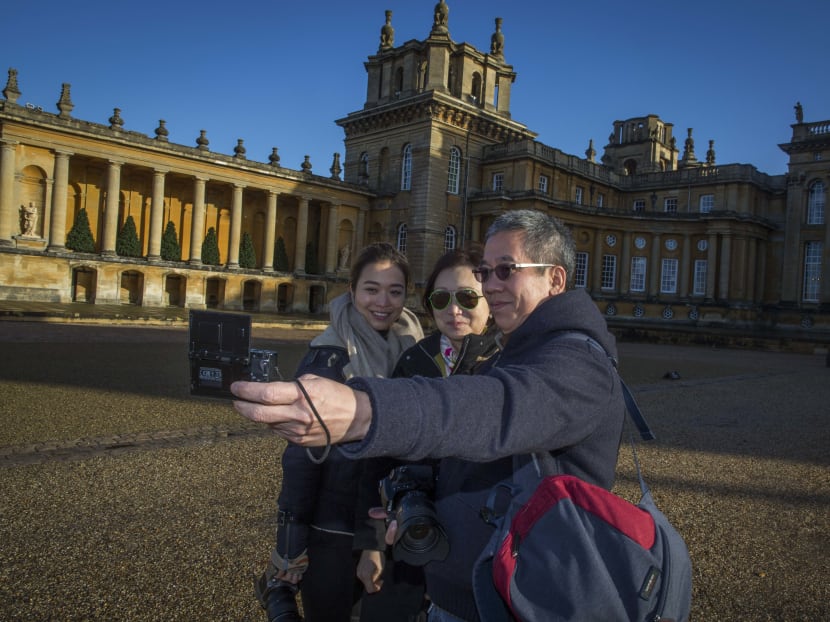British villagers are baffled by flocking Chinese tourists
KIDLINGTON (England) — The Chinese visitors fanned out of a tour bus, and suddenly stopped, transfixed, as if marvelling at the Venus de Milo or the Eiffel Tower. Then they began photographing an unremarkable 1970s suburban home, an oak tree, a rosebush and a garbage bin.

Ms Maria Koo, centre, with her daughter Stephanie Lui and husband, Mr Grandy Lui, tourists from China, take a selfie outside Blenheim Palace in Woodstock, England, Nov 17, 2016. The nearby village of Kidlington has found itself a popular stop for Chinese visitors who snap photographs of their simple homes and streets. Photo: The New York Times
KIDLINGTON (England) — The Chinese visitors fanned out of a tour bus, and suddenly stopped, transfixed, as if marvelling at the Venus de Milo or the Eiffel Tower. Then they began photographing an unremarkable 1970s suburban home, an oak tree, a rosebush and a garbage bin.
“It’s beautiful,” Ms Liu Jingwen of Guangdong province said as one of her travel companions crouched with his camera on the edge of a lawn and took a selfie in front of a small red brick bungalow. A porcelain schnauzer smiled from a nearby window. An angry passer-by yelled: “No photos! We’ll call the police!”
Ever since busloads of Chinese tourists began arriving in this sleepy, nondescript English village this summer, the 13,723 residents of Kidlington, about 5 miles (8km) north of Oxford, have been variously baffled, annoyed and delighted.
The sudden influx of Chinese has also grabbed headlines and spawned a national mystery.
Why, for example, do the Chinese tourists ignore the village’s handsome 13th-century church and its thatched-roof cottages, preferring instead to peer through windows, film parked cars and traipse on the lawns of Benmead Road, a humdrum and modern residential street? One tourist asked a stunned resident if he could help mow her lawn. (She politely declined.) Another jumped joyously on a child’s trampoline in the front yard.
One theory, reported feverishly by the British news media, is that Chinese tourists had been told by a rogue tour operator that the village was the location of 4 Privet Drive, the childhood home of Harry Potter, the fictional wizard. (In fact, it is in Bracknell, Berkshire.) The Sun asked if supernatural forces had delivered the Chinese to Kidlington.
Others suggested that the Chinese had been drawn by Kidlington’s claim to being one of the largest villages in the realm. Or perhaps they wanted to see the Kidlington mansion previously occupied by Mr Richard Branson, the shaggy-haired billionaire?
Such is the interest in the enigma that the BBC dispatched a camera crew to Kidlington, along with a questionnaire in Mandarin to ask the Chinese why they were coming. On a Facebook page devoted to the village, solving the conundrum became a popular parlor game.
Kidlington has had its moments. A history of the village notes that in 1937 three Siberian wolves escaped from the local zoo, causing great panic. And in 1987, the chairman of the parish council touched off a revolt when he tried to turn the village into a town.
But until now, that was about it. A slice of middle England, Kidlington contains, among other things, a public library, seven pubs, two cafes, four restaurants, a main shopping street with a Domino’s Pizza outlet, an immigration detention center and a Baptist church with a sign outside saying, “Try praying”. A three-bedroom semidetached house sells for about US$430,000 (S$610,380), local real estate agents say.
On a recent day at The King’s Arms, a popular local pub, several Kidlington natives feasted on US$8.55 plates of lamb, mushy peas and mint sauce, and puzzled at the town’s newfound fame, as Millie, the pub’s one-eyed dog, padded by. The pub is haunted by a resident ghost called Martha, who worked in the pub in the 1950s, and who is sometimes seen knitting, said Ms Christine McGrath, its jovial manager. A “grumpy old men’s club” sign hangs over the spot where three regulars sit weekly and grouse.
The consensus at the pub was that the Chinese guests had unintentionally helped the anonymous village gain international attention, and were good for the local economy. Ms McGrath said Chinese tourists occasionally entered the pub, ordered Guinness, pulled a face and left. “The Chinese have put us on the map,” she said.
Ms Fran Beesley, 74, an occupational therapist, said she was startled to walk out of her house one day and find a Chinese man photographing her front yard as his family waited nearby. “I’d like to organise cream teas and welcome them,” she said. Other residents have been less amused and have called police.
In point of fact, there is a perfectly logical explanation for why droves of Chinese tourists are coming to Kidlington, and it is hardly going to burnish the local reputation.
Mr Sun Jianfeng, a 48-year-old tour guide with Beijing Hua Yuan International Travel, said guides were routinely depositing in Kidlington tourists who did not want to pay an extra US$68 for an optional Chinese language tour of nearby Blenheim Palace, Winston Churchill’s majestic ancestral home.
As a tourist bus pulled out of town, a group of Chinese visitors waved from their windows, smiling widely. The Kidlington tour had lasted about 15 minutes, but that was more than enough for Ms Liu.
“It’s so romantic,” she said, looking dreamy eyed. Then the bus sped away. THE NEW YORK TIMES






